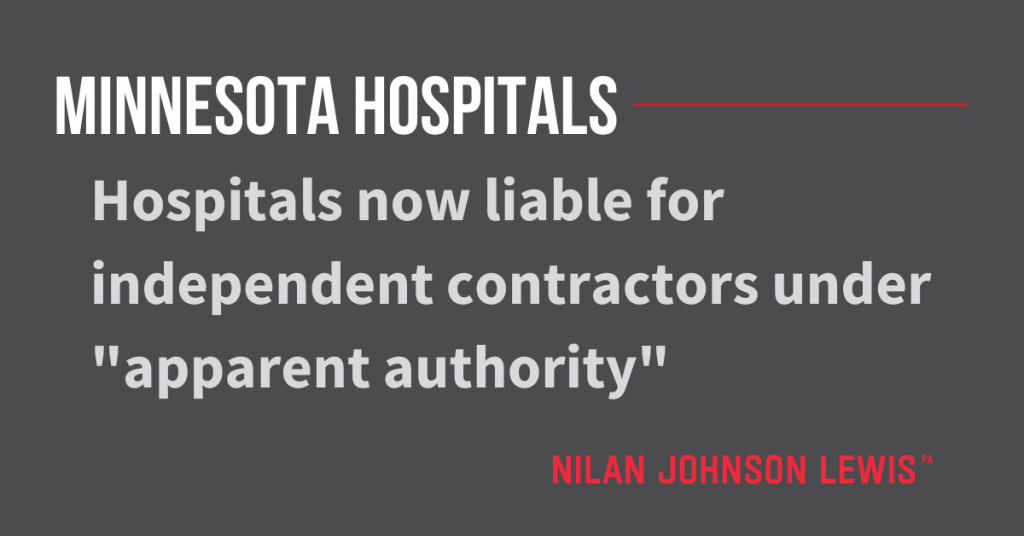
Posted August 3rd, 2020 in Top Stories, Legal Insights with Tags Health Care
New Liability for Minnesota Hospitals: Independent Contractors and Apparent Authority
On July 29, 2020, the Minnesota Supreme Court issued an opinion* that reverses the long-held common-law understanding in Minnesota that hospitals are not liable for the actions of their physician independent contractors.
In the case, a patient visited an emergency department and was released after testing and evaluation. The patient’s condition worsened, and he was taken by ambulance hours later to a second emergency department, where he was diagnosed with a serious stroke. The patient claimed the failure of the first emergency department physician to recognize and treat the stroke caused him significant and permanent harm. The physicians of the emergency department were not employees of the hospital. Rather, as is often the case in local hospitals, the emergency room physicians were employees of a private physician group. The private physician group contracted the services to the hospital pursuant to an independent contractor agreement.
Both the District Court and Minnesota Court of Appeals rejected the patient’s claim against the hospital because of a long-standing, common law rule in Minnesota that hospitals are not liable for the actions of their independent contractor physicians. Instead, the physician group itself would be liable, as the employer of the physician, in cases where liability is determined to be appropriate.
The Minnesota Supreme Court reversed. It concluded that the common law doctrine of “apparent authority” should apply to hospital-physician independent contractor relationships. The Court concluded that hospitals should be treated like other businesses in Minnesota, which are liable when they hold out independent contractors as having authority on behalf of the business.
In a decidedly patient/plaintiff-friendly opinion, the Court describes emergency room patients as lacking bargaining power vis-à-vis the hospital. The Court describes the independent contractor agreement for emergency room physician services as “little known” agreements to limit a hospital’s liability while reaping profits from the services. The Court looks to the holdings of courts in other states to conclude that hospitals are better suited than patients to manage, identify, and address the risks of negligent care provided in their facilities. Finally, the Court concludes that an emergency room physician had apparent authority to act on the hospital’s behalf simply by asserting that the patient sought out emergency care in which the hospital held itself out as providing.
Under this newly announced test, every hospital that holds itself out to the public as providing emergency room care will be liable under the theory of apparent authority for the actions of the independent contractors in the emergency department.
Further, the case could easily be interpreted to apply to all independent contractors of a hospital. Hospitals have hundreds of independent contractor agreements for services provided to patients. Under the apparent authority test announced by the Minnesota Supreme Court, where a hospital need only hold itself out to the public as providing the service at issue, it is hard to imagine an instance where the negligence of an independent contractor would not be attributed to the hospital.
Takeaways
- Hospitals can be held liable under a theory of apparent authority for negligent care provided by independent contractors to the hospital’s patients.
- The Minnesota Supreme Court’s reasoning, in this case, is notably patient/plaintiff-friendly. The Supreme Court’s suggestion that hospitals profit from “secret” agreements with independent contractors for emergency room physician care does not reflect the financial reality of emergency room care. Hospitals are required to have an open emergency department as a condition of federal tax exemption, emergency departments are not generally profitable, and staffing them with contracted doctors has been a widely used strategy. This lack of understanding suggests that other types of care provided by hospitals via independent contractor agreements (services which may result in a positive net income to the hospital, for example) will be treated similarly by this Court, further jeopardizing hospital finances.
- Hospitals should ensure that private groups providing services to hospital patients are required to indemnify the hospital against any claim or potential claim for negligence on the part of the independent contractor’s employees, including the costs to the hospital of defending itself.
- Hospitals will need to require independent contractors to have sufficient liability coverage to back-up the promise of indemnification.
*Popovich v. Allina Health Sys., No. A18-1987, 2020 WL 4342927, at *6 (Minn. July 29, 2020)

